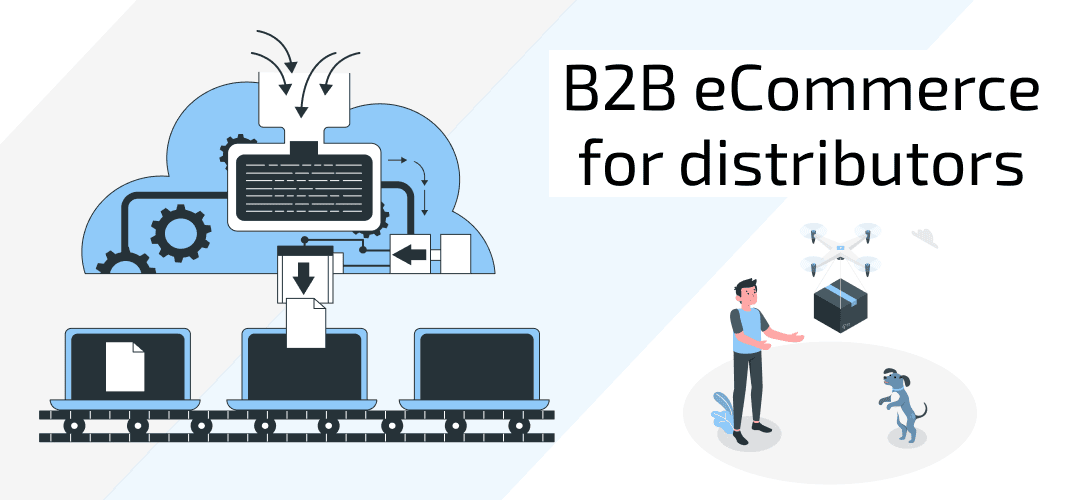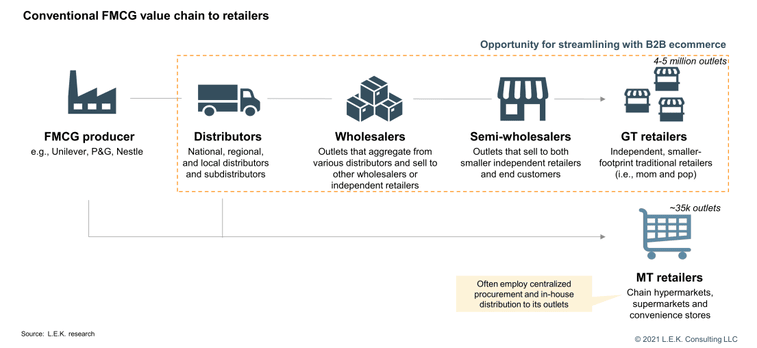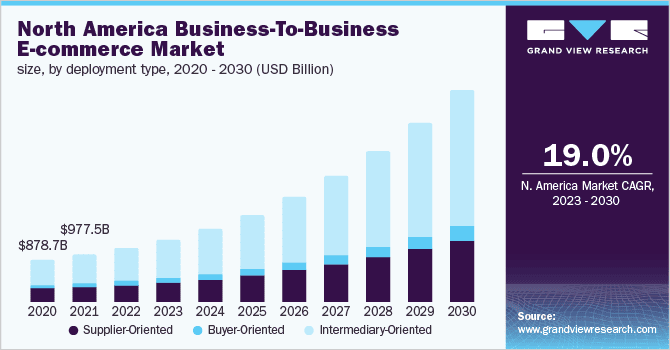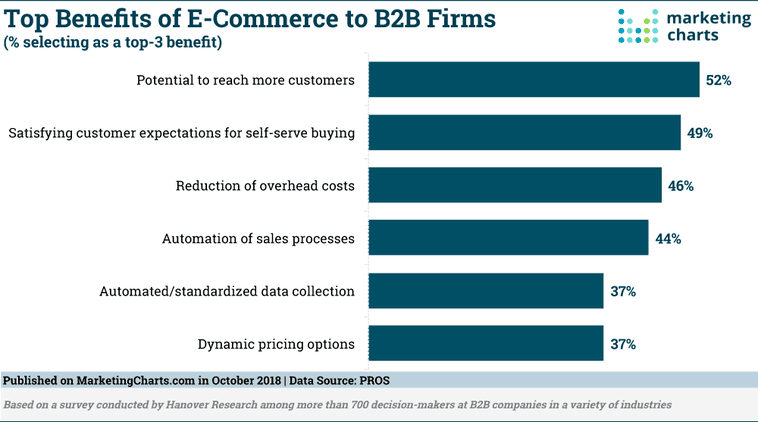
B2B distribution has been significantly impacted by the expansion of eCommerce. In the past, companies relied on paper catalogs and brick-and-mortar stores to reach their customers. But now their clients are increasingly using the Internet to research products and make purchases.
These changes have also affected the way businesses run. Instead of large inventories of products, thanks to eCommerce, they can now benefit from just-in-time inventory management techniques. According to Statista, B2B eCommerce is predicted to account for 17% of all B2B sales in the US ($1.8 trillion) by 2023.
However, implementing B2B eCommerce for distributors isn’t an easy task. Contrary to B2C, B2B customers go through a very complicated buying process because so many people are involved. Additionally, each order has a higher value. As a result, customers carefully consider their options before selecting the final supplier.
Today’s B2B customers expect that their distributors will be reachable online and will provide complete, up-to-date product information through user-friendly ordering systems. A B2B eCommerce website attracts new customers and gives them the desired option to browse, buy, and place repeat orders.
In this blog, we'll talk about how B2B distributors can use eCommerce to expand their customer base and increase their satisfaction. Let’s dive into it!
What is B2B distribution and why distributors need eCommerce?
B2B distribution means selling and delivering goods to another business. such transactions, a company buys products from a manufacturer or supplier and then sells them to retailers, wholesalers or other manufacturers.

A distributor typically serves as a middleman between a manufacturer and a customer. Most distributors and manufacturers enter into agreements that grant the former the right to represent the manufacturer in particular regions.
Once the retailer or wholesaler gets packaged and shipped goods, they make the final decision regarding what to do with the product. The majority of wholesalers and retailers will sell these products directly to final consumers.
According to recent reports, 73% of current B2B buyers are millennials. And millennials approach the B2B purchasing process with similar expectations to those of B2C consumers. Instead of in-person meetings, product demonstrations and sales calls, they favor quick ways of research, evaluation, and purchase.
Thus, distributors should adopt modern methods of conducting business. B2B eCommerce gives them the flexibility and capacity to deliver exceptional customer experiences.
Understanding the key challenges facing B2B distributors
Industrial distributors face numerous difficulties in managing their businesses as the ecommerce sector, technology, and customer expectations all continue to evolve.
- Outcompeting pure-play distributors. One of the biggest obstacles is the emergence of major international players like Amazon, Alibaba, and eBay. Because they have abundant resources and a sizable digital presence, many customers turn to those companies for procurement, making it difficult for smaller B2B distributors to outbid such pure-play distributors.
- Complex shipping requirements. B2B buyers anticipate a similar experience to that of B2C customers, including 24-hour customer service, order tracking, quick delivery and accurate orders. It is also necessary to take into account buyer-specific requirements. This might entail sending out smaller shipments, transporting heavy objects, offering real-time rates, achieving EDI compliance, etc.
- Difficult to go online. Many B2B wholesale distributors still make sales and take orders over the phone or via email. However, B2B buyers are increasingly using websites to conduct research, get in touch with distributors, and purchase from them. Sticking to traditional methods has the following risks: missing out on chances to interact with their target market; fewer opportunities for sales and lower profitability; lagging behind international B2B eCommerce players; increased manual operation errors and inefficiencies.
- Disintermediation between buyers and sellers. A supplier chooses to sell directly to the retailer, wholesaler, or other consumer, which cuts out the distributor from the supply chain. Disintermediation can also occur when a distributor is ineffective at satisfying customer needs.

B2B eCommerce distribution vs traditional distribution: what are the benefits for your business?
B2B distributors face numerous obstacles, but by utilizing a few best practices they can successfully overcome them. Building a strong eCommerce presence is one of possible solutions which can help gain a competitive edge and enjoy the following benefits.
- Build strong relationships with customers and suppliers. Retaining transparency is essential to keep good relations with customers and suppliers. This includes clear pricing information that takes into account shipping costs and any applicable volume discounts, as well as clear communication about delays, errors, or updates.
- Ensure a seamless customer journey. While the B2B industry's complexity can make it challenging to feel seamless, improving the process from cart to delivery will satisfy customers and boost loyalty. To make every customer feel like they are in the loop, automate customer communications and updates. You should also keep a strong customer service program in place to quickly troubleshoot and fix problems.
- Gain more control over the sales cycle. The interactions on a website for distributors are quantitative and trackable. In addition to sales data, order totals and abandonment statistics, there are more tools that give insights into the sources of web traffic and the actions users take. More information leads to better decisions and greater effectiveness. Distributors have more freedom and flexibility to implement improvements, conduct A/B testing, and streamline processes.
- Enjoy endless customization and innovation. Highly adaptable and flexible features of eCommerce make it easier for distributors to enter new markets, without requiring a significant upfront investment or risk. Businesses need to think about adding an eСommerce channel if they want to stay relevant. Before making a purchase, most customers consult with the Internet rather than with a salesperson. This way you can stay abreast of shifting online B2B trends.
The benefits of adopting eCommerce are not limited to the sphere of B2B distribution. They are also common to manufacturer, wholesale, B2B2C eCommerce, and other types of businesses. Despite specific features and requirements, all of these spheres would benefit from faster order fulfillment, improved sales engagement and enhanced analytics.
6 requirements for a B2B distributors eCommerce platform
To boost sales, conquer new markets, attract new customers and enhance internal efficiency, B2B players need a versatile and secure eCommerce platform for distributors with sophisticated features.
An eCommerce platform might look like an additional burden that will strain your resources and raise your operating expenses. Actually, by automating your operations, it will help you streamline and lower operating costs.
Once your eCommerce platform is running, you can use digital tools for analytics, inventory tracking, and other tasks to improve your supply chain. As your business becomes more efficient, your customers' experiences improve, fostering loyalty to your brand and increasing long-term sales.
To manage different business aspects effectively, your eCommerce store must have the following features.
1. Advanced search functionality
B2B distributors tend to have tens of thousands of SKUs, which makes product search a challenge for a customer. Since the success of any eCommerce strategy depends entirely on the user experience, it is a must to ensure good searchability.
To fix this, B2B distributors should incorporate sophisticated and user-friendly search functionality into their online shop. They should choose how to arrange products before uploading any of them. Merchants will benefit from the option of sorting the products by width, color, brand, shape, price, and other factors.
All in all, giving users access to sophisticated search tools, like faceted search, will result in happier, more enthusiastic customers and, ultimately, higher sales.
2. Account-level and customer role control
Account-level controls are a vital requirement for B2B eCommerce for distributors. Such businesses need to juggle a number of stakeholders, various departments and locations. As a result, some users from the same company often log in to view order history or find other information.
Furthermore, various purchasing habits require a variety of purchasing scenarios. Some customers might insist on using 30-day invoices with a sizable credit limit, while others prefer to pay with a credit card. You can accommodate various payment terms and support account-level controls with a suitable B2B eCommerce solution for the best user experience.
3. Customer-specific pricing
B2B distributors have many things to consider and plan for when it comes to pricing. When you have to customize pricing at the level of customers, managing the pricing models can become really complicated.
For these purposes, an eCommerce platform should support a general digital commerce strategy because some products will only be available in specific markets or to specific customers, and shipping rates and options will vary based on location. Based on the contract or purchase history, the appropriate technology should allow to update and tailor pricing down to the customer level.

4. Personalized product recommendations
Product recommendations make it easier for customers to purchase using cross-sell and upsell opportunities. Cross-promotion often informs customers about the products they didn't even know the distributor offered as they transition from offline to online purchasing.
eCommerce websites with the appropriate technology can provide highly customized experiences, including: optimization of the product page with related products; optimization of the homepage with customized featured products; optimization of the shopping cart with related products; using customer information (such as geolocation or demography) to suggest products, which leads to a significant rise in conversions and a decline in cart abandonment.
5. Fast reorder and bulk order
Customers can add multiple items to their cart at once using the quick order form. It's a perfect solution for B2B buyers who are well-informed about what they need and only visit the wholesale storefront to place their orders.
A one-click reorder and bulk order option will enable quicker and easier purchases for wholesalers: sample order forms for products and their variants; bulk hide items by product or by customer; fully customizable with multiple settings to explore.
6. Omnichannel support
Omnichannel is quickly turning into a requirement for successful online stores, especially in the B2B sphere. In this regard, a company can ascertain the preferences and interests of its customers. They could use this knowledge to better balance objectives and messages across all channels, which would improve the customer experience.
Select a suitable eCommerce platform for B2B distributors
By offering powerful features and flexible customization tools, a B2B eCommerce platform helps distributors in fostering relationships with their online customers.
You can easily draw a picture of your ideal eCommerce solution by combining what you need and what you already have. Depending on its usability and level of coding expertise, each platform has its pros and cons. Of course, there are differences in the costs associated with each platform. Therefore, determining your company's capabilities and choosing the right platform are crucial.
nopCommerce can become a weapon of choice for enterprise-level companies as it combines a solid architecture and multiple customization options (thanks to the available source code). With the ability to grow over time, your online business can eventually add new features to improve your webshop. Flexibility and scalability are among the most essential features since they define the current state of development and growth strategy for upcoming years.
To ensure that customers receive the best possible service, the nopCommerce platform creates relevant online product catalogs, implements client-specific pricing structures, and develops unique customer processes. Additionally, your webshops will be fully responsive, enabling their use on any tablet, desktop, or mobile device.
With nopCommerce, distributors can get all kinds of digital presences: B2B eCommerce portal (multi-channel user experience), full-fledged B2B marketplace (implementing a custom business model), hybrid B2B2C platform (adopting new product and customer niches), which a competitive advantage on this ever-growing online market.
Bottom line
The market for B2B eCommerce is still expanding and doesn't appear to be slowing down. For distributors, it offers a special chance to take advantage of a fresh sales channel to draw in new clients and give their current client base value-added services.
All in all, the risk of failing to meet the shifting customer expectations and falling behind is significantly higher than adopting a new tool or acquiring a new sales channel. Consider adding an eCommerce solution to the mix if you're thinking about the long-term growth of your distribution company.